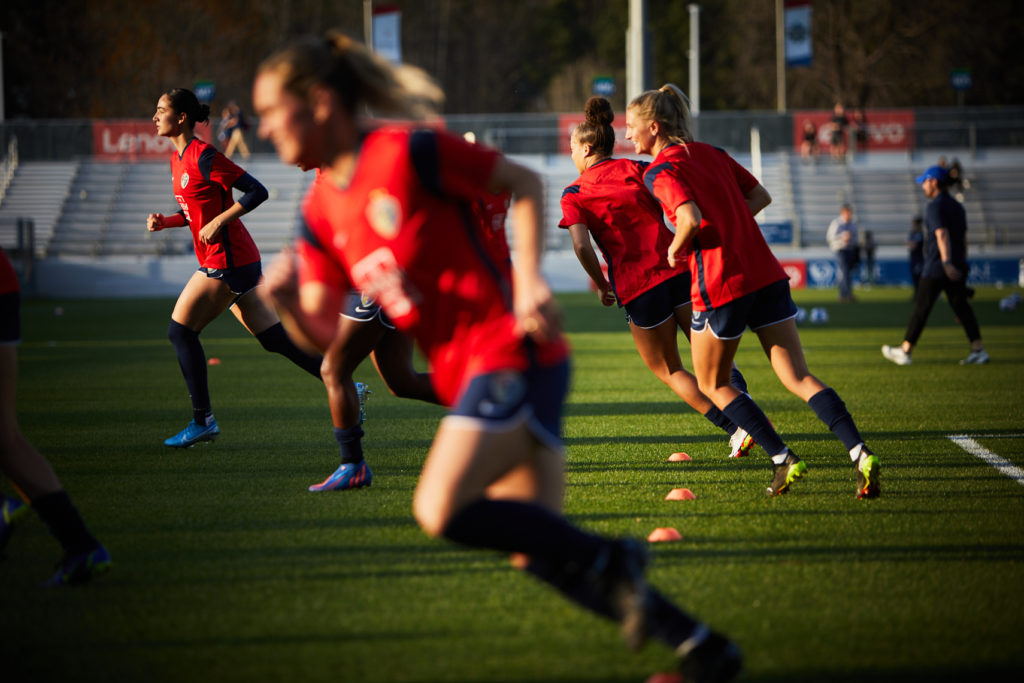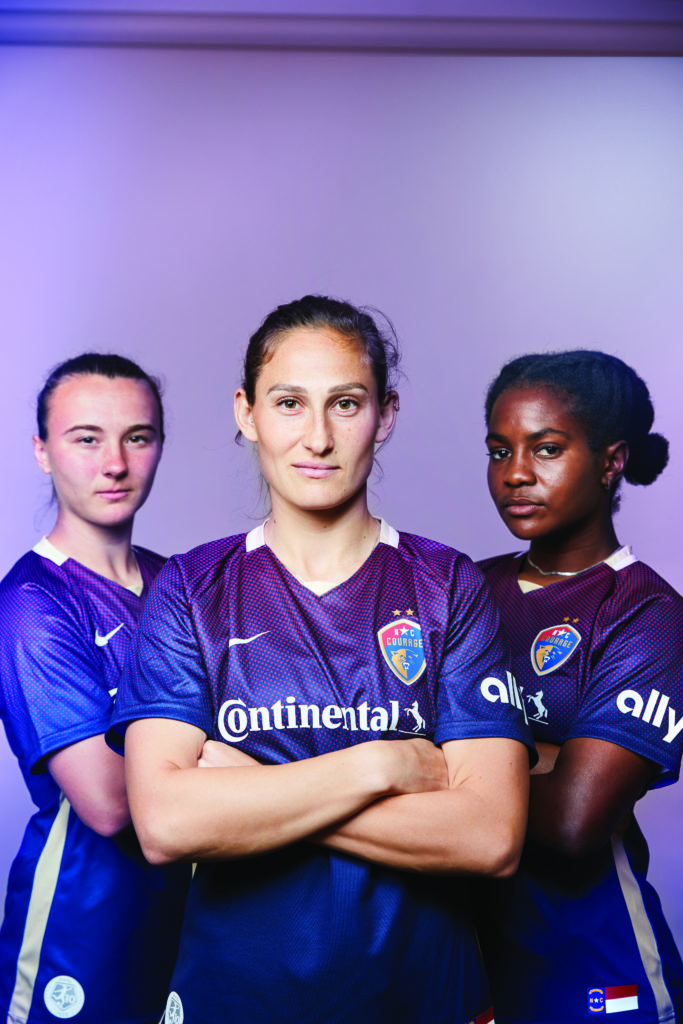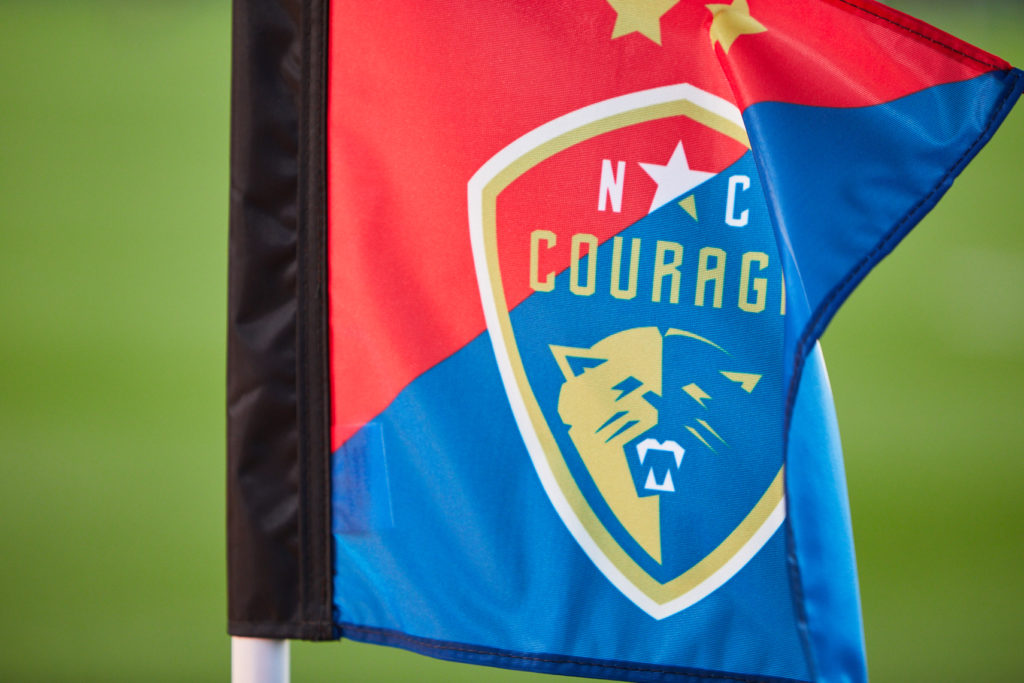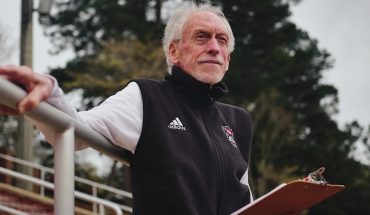Five years in, the Triangle’s own champion women’s soccer team builds on strong Carolina roots.
by Matt Lail | photography by Geoff Wood
When midfielder Brianna Pinto was traded to the North Carolina Courage by the NJ/NY Gotham FC in early December, it fulfilled a lifelong dream for the second-year National Women’s Soccer League (NWSL) player. After all, Pinto’s love of the game began as a youth player right in the Triangle. She dreamed of suiting up for the University of North Carolina Tar Heels and, eventually, as a professional soccer player for the Courage — and she did. “My heart lies in North Carolina,” she says.
Midfielder Haleigh Stackpole — another Triangle native, selected by the Courage in the third round of the 2022 NWSL draft out of Ole Miss — also found her footing in the area’s youth soccer programs. She’s proud of the opportunity to wear the jersey of one of the most successful professional women’s soccer clubs on the planet — one that just so happens to call Cary, North Carolina, “home.”
Pinto and Stackpole have the drive and the talent to reach their goal, and they offer inspiration to young soccer players in the Triangle. “Our community will be better off for examples of youth-to-pro like Brianna and Haleigh,” says Dean Linke, who has been the broadcasting voice of the Courage since the team’s inception.
Since its first season in 2017, the Courage have won the league’s regular season title three times and postseason title twice. The club also won the inaugural Women’s International Champions Cup in 2018, beating France’s Olympique Lyonnais Féminin. (North Carolina was the runner-up the following year.) “It’s a proud moment for me every time I put on this club’s shirt,” says veteran midfielder Denise O’Sullivan, who’s also a member of Ireland’s national team. O’Sullivan has been on board for the Courage’s entire run of success. “The Courage culture is showing up every day and putting in the hard work,” she says. “That can get you to a good place.”
The players are particularly determined to get to a good place after last season. In September, then-head coach Paul Riley was accused by players across the league of sexual abuse. Seemingly overnight, the focus on wins and losses came to a screeching halt. Riley was dismissed and Sean Nahas was named interim head coach (the “interim” tag was officially removed in December), but the situation led to uncomfortable conversations on and off the field — and in the public eye. “It was draining,” says O’Sullivan. “We showed a lot of strength by showing up to training every day when our minds really weren’t in it. But when something like that happens, it unites people.”
When the season resumed, they opened the matches with a show of solidarity: players from both teams formed a circle at midfield, linked shoulder-to-shoulder for a long moment of silence. “It left me breathless,” says veteran defender Kaleigh Kurtz. “It was such a strong, powerful moment of us saying, enough is enough.”
Fans roared in support. “It gave us a chance to talk with our daughters on the way home about what happened,” says Ryan Johnston, a Raleigh mom whose daughters both play youth soccer and whose family regularly attends Courage games. “It wasn’t an easy conversation, but it was so inspiring to see these women being so resilient.”
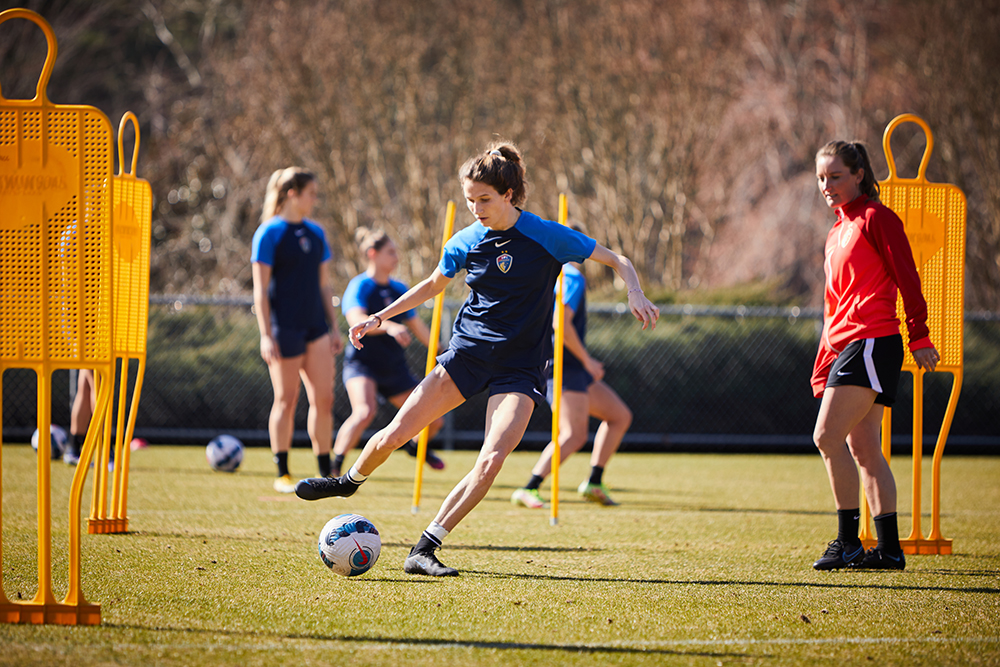
A comprehensive, joint investigation between the NWSL and the NWSL Players Association is ongoing. Kurtz commends support from administration. “The league is now putting players’ safety and well-being first,” she says. In a statement, team owner Stephen Malik said the game “is profoundly influential among girls and young women everywhere, and it is incumbent on us to set a standard of conduct that earns their trust.”
So this season the focus is on moving forward, together. The team is welcoming 11 new faces, building chemistry, and getting better each day. Along with Kurtz, the Courage still boasts stalwart defenders Abby Erceg, Ryan Williams, and Carson Pickett, who was named to the NWSL’s 2021 Best XI First Team, the league’s top honors. New Zealand-born defender Katie Bowen — another former Tar Heel — helps bolster that back line.
At midfield, O’Sullivan can glance across the pitch and see Brazilian star Debinha Miri (known simply as Debinha), along with Meredith Speck, whom Nahas calls an energetic team leader. Another Brazilian international, forward Kerolin Nicoli Israel Ferraz (who also goes by just her first name), signed with the team in January. “She will be one of the most exciting players in the league,” says Nahas. “We’re going to play, and we’re going to attack.”

The team’s first-round pick, Virginia Tech midfielder Emily Gray, can see that focus in the approach by players like O’Sullivan. “The intensity level in training has been really high, and Denise doesn’t make a lot of mistakes,” says Gray. “Details are super important at this level, and players like her demand a lot and hold you accountable.”
The Courage have built a fan base fueled by their dedication and skill on the field, yet they also relish the opportunity to be role models to the next generation. “When I was younger, anytime you turned on the TV, it was boys playing sports,” says Danielle Labrada, who coaches the NCFC 08 Thorns girls club, a local Challenge-level team. Caroline West, an elementary schooler on the Thorns, says it is important for players her age to see strong women competing. The loyalty here in the Triangle has impressed club president Francie Gottsegen: “The connection Courage fans feel to the team is like nothing I’ve experienced before,” she says.
Perhaps no one appreciates that connection as much as Pinto. Sahlen’s Stadium at WakeMed Soccer Park was her home field both during her youth club days and even while at UNC, during renovations to the Tar Heels’ Dorrance Field. This place is her stomping grounds. “It’s so special to be an example that you can work your way up through the soccer system and come back to represent your local pro team,” she says.
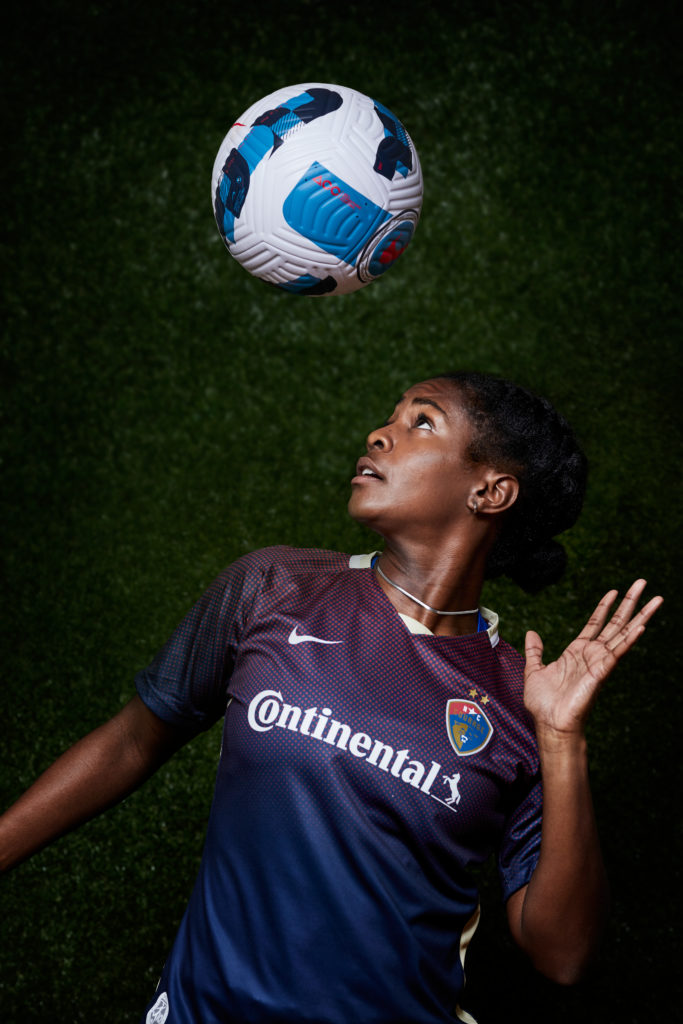
It’s also a time when a career is becoming a better option for players. Not unlike other sports, women’s soccer has had to play catchup with the men’s leagues. For years, NWSL games were aired midweek, and midday, on the Lifetime Network. But this season, games will be broadcast via CBS Sports and associated entities. The NWSL and the NWSL Players Association also recently signed the league’s first Collective Bargaining Agreement that increased pay and compensation across the board. “We’re getting compensated better than we ever have before,” says Kurtz, who was one of the Courage team representatives during negotiations. “It raises the standard.”
And in February, the U.S. Women’s National Team and U.S. Soccer (the sport’s governing body in America) settled a lawsuit that ultimately means an equal rate of pay for men’s and women’s players for the national teams.
Not that there aren’t still improvements to be made in the sport. Labrada, the youth coach, attended a coaches’ training session last summer when she noticed she was the only female coach on hand. Since then, North Carolina Football Club (NCFC) has created a Women’s Coaching Collective aimed at investing in female coaches throughout the various levels of the organization. According to NCFC, in fall 2021, girls made up 60% of players across all ages and levels, while a spring 2021 survey found that women only made up 12 to 15% of total coaches in the system. The club plans to use these numbers as benchmarks moving forward.

But the development goes beyond the field and even involves opportunities in the boardrooms, administration, press boxes, and beyond. According to Gottsegen, NCFC is working to ensure that the players have opportunities awaiting them once they hang their boots up for good: “We really want to create a bridge for young girls so they realize that soccer can be an opportunity for them as a long-term career.”
It’s a message that will resonate for generations to come. “It’s very important to show the girls I coach that we have a women’s team here that is in the top division in this country. It validates what they’re doing,” says Labrada. “It’s a way of saying, look what you can do, if you want to, right here in North Carolina. It’s not impossible.”
__
This article was originally published in the April 2022 issue of WALTER Magazine.

